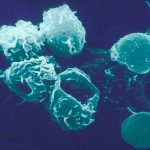Lien vers Pubmed [PMID] – 27141927
Sci Signal 2016;9(426):pc10
This Podcast features an interview with Rachel Golub and Eric Vivier, authors of two Research Articles that appear in the 3 May 2016 issue of Science Signaling, about plasticity of innate lymphoid cells (ILCs). ILCs are related to the T cells and B cells of the adaptive immune system, and they regulate immune responses by secreting cytokines. ILCs are a heterogeneous population of cells that can be classified into several subtypes. Type 3 ILCs (ILC3s) can be further subdivided into distinct subpopulations. Chea et al found that Notch signaling controlled the relative proportions of different ILC3 subtypes in the mouse intestine. A related study by Viant et al reports that the Notch and transforming growth factor-β (TGF-β) signaling pathways antagonize one another to control the balance between different subsets of ILC3s. Both studies demonstrate that ILC3 fate is plastic and can be influenced by signals present in the microenvironment of these tissue-resident cells.Listen to Podcast.

